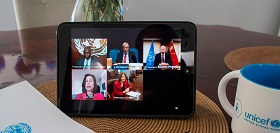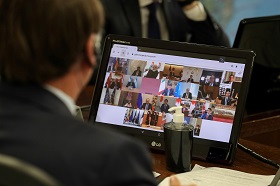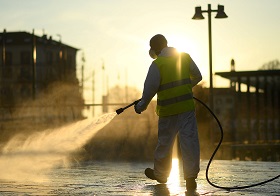Interview with Dr Richard Pilch, Director of the Chemical and Biological Weapons Nonproliferation Program at the James Martin Center for Nonproliferation Studies. Since 9/11 and the “anthrax letter” attacks of 2001, he has focused on national security issues and spent nearly ten years overseas, including Russia, assessing and addressing biological warfare, bioterrorism, and public health emergencies. Dr Pilch has led many threat reduction programs on behalf of the US government, served on over 30 technical panels and advisory boards. He is the author of over 60 publications and co-editor of the Encyclopedia of Bioterrorism Defense.
Is there a risk that terrorist groups could use the novel coronavirus as a biological weapon?
In America, we have seen reports about some groups here that we call extremist groups—although they might not fit the official definition of terrorist groups—that have had some discussions on the internet and other social media about using infected people within their group for transmitting the virus, as vectors for transmission to target populations. That means that someone who is part of their group, who is sick with COVID-19, intentionally goes to locations where he or she can come in contact with people that the group wants to target, for example, because of religious beliefs or political beliefs, and deliberately tries to spread the infection that way.
That is one thing that we have seen. The other thing we have seen in America is individuals—again, not terrorist organizations but individuals—who are claiming that they have COVID-19 and then threatening either law-enforcement officers or security personnel at stores with spitting on them. And using that as an approach to try to either steal something or get out of trouble.
While neither of these examples is a terrorist organization, what they show is that there is some mindset in subgroups of people that this virus may be used for benefit. And in both those cases, that may not fit the definition of terrorism. Still, ultimately I think that there is a possibility that terrorist groups may try to do something similar.
What should governments do to prevent this so-called “pandemic terrorism”?
There are really a couple of things. The first is to be very careful about monitoring indicators of intent. That means that the Russian, US and other governments around the world are carefully monitoring what we would call a chatter across social media sites, where groups are talking to each other and sharing ideas that may be counter to the interests of the government or public health. In this case, in the US, what we really need to do is be aware of any indicators in that chatter that people are talking about this idea. And I would recommend the Russian government and any other government do the same.
The second step is to actually deter the potential perpetrator from going forward with such an attack. Internationally, there's an international body called the Biological Weapons Convention. It is signed by Russia and the United States. And what that says is that we will establish national legislation to prohibit any biological weapons type of activities. So while there is no international law, the countries that are party to the Сonvention create their own national laws that meet the aspirations of the Сonvention. In America, we have laws that make it a criminal offence not only to use any sort of biological agent with intent as a weapon—which would be if someone actually went ahead and did these types of plots—but it is also against the law to even plot these types of activities.
If we are monitoring indicators of intent on social media streams, then we will find what looks like a real plot for using the virus as a weapon. Then, we do not need to wait until there is an attack. We can actually go and interdict the group at that point and charge them with a criminal offence strictly for having the plot to do it. And I assume Russia has the same regulations. That is the second thing. So the first thing is to sort of disrupt the group and interdict any indicators of intent. The second thing is to deter the actual use of the agent or the plotting of the use by having criminal legislation in place. And then the third step is really a defence.
The best thing we can do to prevent an attack is to shore up the vulnerabilities in target and potential target populations. We need to protect our populations through public health measures, through the necessary security means. For example, in Russia, certainly, you would want to make sure that your political establishment protects on both those fronts as we do in America. You would want to look at what potential target populations adversaries are discussing in their chatter and then just make sure those target populations are protected. So it is sort of a three-part way to address the threat.
In your opinion, does social distancing work?
My opinion is that it works, although I think it depends on what we are talking about. If we are talking about public health and trying to keep the virus from spreading naturally, my opinion is that it works. Yet the question is how long we have to keep doing it. Because some of the thinking is that no matter how long we social distance, eventually, people are going to need to be infected by this virus so we can establish global herd immunity. Or else, we stay apart long enough for a vaccine to be developed. So the idea of social distancing is in part to keep people from getting infected, but in part, it is just to spread out those infections. And we are spreading out those infections, at least in the US where we operate with a very profit-focused medical infrastructure that has limits on the amount of patients we can accept in our hospitals and our intensive care units and limits on the amount of supplies and equipment we have.
Spreading out cases prevents that infrastructure from being overcome. So the part of the objective is just to spread out the cases. Then part of the objective is, if we can, we want to keep people from being sick either until the virus itself fades out, maybe for seasonal reasons, which does not look likely, or we have a vaccine, which will take some time, or other things. So that is just the natural impact of social distancing. And then, back to the discussion of deliberate use. If your question is whether social distancing helps with preventing deliberate use, I think it does because now there are no obvious target populations. Early on in the outbreak, it would be possible in America, for example, to walk into a church and infect everyone in that church intentionally or try to infect everyone in that church intentionally. But now, we are not congregating in churches anymore. So it removes those obvious target locations.
A man coughed on a supermarket employee and said that he was infected with the coronavirus. Where should one draw a line between ignorance and criminal intent?
I would say that the law needs to be enforced. What we would say in America is the law needs to be enforced in a vacuum, which basically means that the law is the law. If you break the law, you need to be charged with it. When we need to get into the nuances of whether people actually had malicious intent or were simply ignorant, that is the decision in America for our court system. If someone gets arrested, that does not mean they go to jail. Just like in Russia, they go to court and the case is presented against them, where they have the opportunity to defend themselves. They are innocent until proven guilty. So, a decision based on what their intent is happens at that level. Whereas initially, I think we really do have to enforce the law. Otherwise, both in Russia and in the United States, this will set a precedent for people continuing to do this and thinking that it is okay. And there are a number of different risks that would come with.
What are the prospects for international cooperation in the field of protection against biological weapons and pandemics? In what ways could Russia and the US work together to reduce these threats?
I worked in Moscow starting 2003 and lived in Moscow from 2004 to 2006, working on cooperation in the fight against biological weapons and global health threats like COVID-19. The program was a Russia-US program. I worked with Russian scientists like myself, who were intent on addressing these threats. The program itself started as a nuclear program, but what really made it valuable on the biological side was that it came after 9/11 in the United States and then the “anthrax letters” that were mailed in the United States. And at the time, President Putin and President Bush were very public about their desire in the face of these threats to work together.
So I was sent to Russia and lived in Moscow, but I flew all over the country, I worked with scientists and our cooperation to address these threats was very real. Since that time, things have changed. But my hope is that COVID-19 will reinvigorate that relationship and provide the opportunity for us to work together again. The opportunity is not simply based on transparency and trust, which can be a limiting factor. The opportunity is based on our role as leaders of the global community. And I think that Russia clearly has a leadership role. The United States must take a leadership role. China must take a leadership role. And for at least the three of our countries to be working cooperatively against natural or deliberate biological threats, I think, is one of the real cornerstones for us to prevent another pandemic like COVID-19.
And that cooperation comes on a number of levels. I think that the biggest thing is simply open information sharing. But the second is a technical exchange. And going back to what we used to do in those early years of the 2000s when I lived in Moscow, scientists in Russia were doing great research, we were working with scientists in America doing great research. They were advancing not just the understanding of these diseases but the countermeasures to battle them. Advancing diagnostics, vaccines, therapeutics, and building a global surveillance and detection network that enabled us to quickly identify and address these global health security threats as they emerged. That is what is missing on a global level. And I really hope we can get to it again.
North Korea claims that it does not have cases of coronavirus. Does it sound plausible?
North Korea is geographically close to the outbreak, but its borders are fairly secure. The thing about this virus is that it only exists in people and animals and on the surfaces around them. What that means is that every single case is connected. If we could actually map all the cases, we could map them back to presumably somewhere in the Wuhan region of China. And then we could see a person flying to Italy and an outbreak there. And we could see a person from Italy flying to a part of America and an outbreak there. And we could see a person in a part of America flying to another part of America and starting an outbreak there.
Even though it seems like the virus is sort of everywhere, it is all in people connected over time, across and around the globe. So if North Korea's borders are so secure that no individual came from or travelled to an area where the virus existed and then transmitted it back to North Korea, then, it actually is plausible that they would have zero infections. However, I think a greater likelihood is they at least had some limited amount of infections, just because of how readily this virus transmits. And because I do believe that there is still some travel or at least initially during the outbreak, there was still some travel between North Korea and China.
Could economic implications of COVID-19 pandemic fuel unrest in the Middle East?
I certainly think so, the economic impact of this virus can fuel unrest anywhere. There are challenges with balancing the economy, public health, and international security. In America, the challenges are how we balance the economy versus public health as we start over the next, I would say, two months to go back to work. In the Middle East, there are sanctions against certain countries that limit their ability to receive certain types of commerce. And I think that, as a global community, we need to weigh from a humanitarian standpoint what the balance is between international security, economy, public health, and as human beings what is the right thing to do. I think that we really are a global community and we can not simply say that because sanctions are rightly in place in certain countries, that prohibits us from ensuring the right level of humanitarian aid is received by these countries.
Interviewed by Tatyana Kanunnikova.








